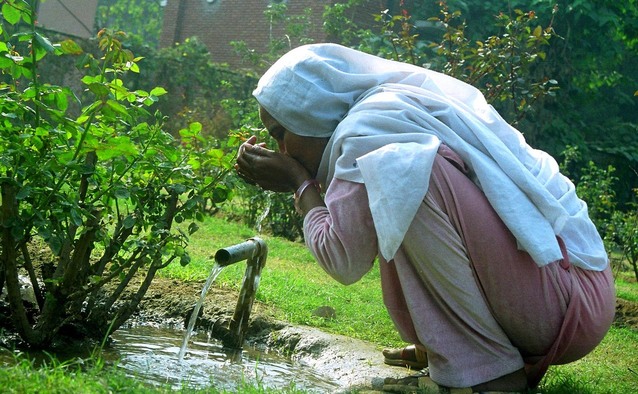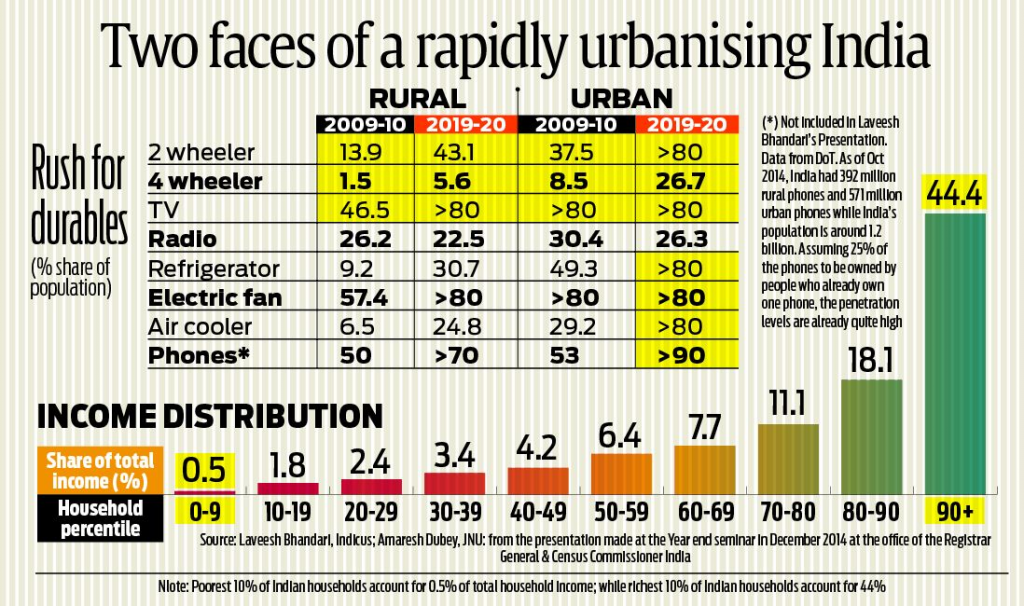R N Bhaskar
23 February 2015
Almost everybody is now reconciled to the inevitability of urbanisation.
Even as early as January 2007, Goldman Sachs had in its economics paper (No152) on “India’s Rising Growth Potential” pointed out how the 21st century would be India’s “urban century”.
The report predicted that India’s rate of urbanisation would see another 140 million rural dwellers move to urban areas by 2020, and an additional 700 million people by 2050. This is a scale of migration the world has never witnessed.
Even so, as the report points out, India’s urbanisation level of 29% is still very low. South Korea has 81% of its people in urban dwellings, Malaysia 67%, China 43%. Both pull and push factors would drive people out of villages. And that is where PM Modi’s vision of smart cities makes immense sense.
Demographic tinkering
Unfortunately, urbanisation has been blamed for the emergence of slums in cities. In reality, slums emerge when there are no alternative plans for affordable (or rental) housing schemes. But it is mostly due to political patronage. It is one way in which politicians try to fix the roll of the electoral dice through demographic tinkering.
The politicians arranges for a group of migrants to have a place of dwelling in the heart of a city. In exchange he asks them for their vote. Then, in order to reinforce the slum-dweller’s loyalty to the party in power, he further adds the dispensation of cheap water and electricity.
Sadly, the courts have not taken cognizance of the fact that any attempt to alter the demographic profile of a region is nothing short of a deliberate attempt to fix the electoral process. It savagely erodes the concept of local management bodies, because the profile of the location has been altered by the influx of vast numbers of ‘squatters’ in that area.
One good way to curb demographic tinkering of this kind is by redefining the rights of any voter in India. This is because while the right to vote is a fundamental right, its exercise is dependent on other equally important rights. One right cannot be allowed to erode other rights.
For instance, the government could allow migrants to vote in a city only after they have acquired a ‘legal’ address. Thus, the migrant’s right to vote is not taken away (that would be both sacrilegious and illegal). But the place where the vote can be cast would be where the person had a legal right to a shelter (possibly in the place where the migrant comes from). If the person is homeless, the state needs to build sanatoriums or reserved spaces which the homeless could use as their address.
Such an interpretation would take away the temptation of extending political patronage to slum development. It would prevent the erosion of the rights of existing settlers as well. The urge to encourage the formation of slums needs to be curbed.
Generous with other people’s money
The other problem relates to the penchant of legislators to dispense subsidies to the so-called needy. Sadly, Arvind Kejriwal, the present Chief Minister of Delhi, is not the only one to push for such subsidies.
Look at the table alongside. It shows how, both in rural and urban areas, over 80% of the population will have access to some mode of transport (two-wheeler or four-wheeler), communication (telephones) and entertainment (television, which is also a medium through which access to information such as advertisements and news can be got).
There is one common thread linking all such acquisitions — they are purchased without any element of selective subsidy. This goes to show that people are willing to pay the market price for something they want. This is in spite of the gross income inequalities the country faces. Significantly, this is also true of urban slums when compared with non-slum urban areas. But more on that next week.
It is politicians who stoke the fires and urge them to demand subsidies of things that the government controls. Till recently, all electricity distribution was in the hands of the government. Hence the politician/legislator thought that he could freely hand out subsidies to a section of the population which would vote for him.
Ditto with water.
The ability to pay
But, will poor people pay for water and electricity?
Yes. There is anecdotal evidence from the Punjab where farmers who wanted subsidised power have got used to erratic supply of electricity from the state. Hence, for their ‘critical’ needs like water pumps, refrigerators, television sets, and fans (if not air-conditioners), they use diesel gensets or power inverters. The cost of power is over Rs10 a unit. In other words, they pay an even higher tariff for the power they need.
Or take Gujarat where farmers have begun paying for electricity, though opposition parties are trying to ‘teach’ them not to pay for this utility.
Or, take the slums of Mumbai. Many of them get water through water tankers. The price they pay for this water is over Rs800 for 10,000 litres, or 8 paise a litre. Some even purchase bottled water at Rs10 a litre. Yet these very slums do not want to pay the 2 paise a litre which the municipal corporation wants to charge. Eventually, the sorry state of finances for the state-owned water department will allow legislators to make a case for privatisation of water supply.
Look around, and you will see slum dwellings fitted with TV cables and other signs of consumerism (sometimes air-conditioners) that belie their inability to pay the normal price of electricity and water. Need we say more?
Moral: it is time to curb demographic tinkering on the one hand, and the urge to dispense subsidies on the other.
The author is consulting editor with DNA.
Read the original article here.
For more on India and its policies, click here.




































COMMENTS